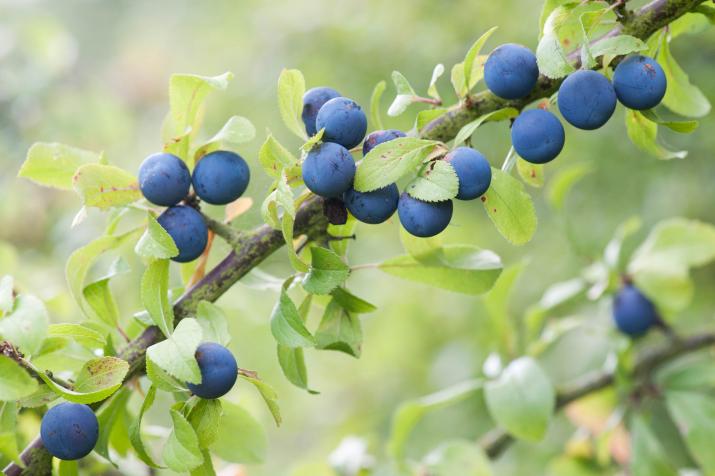Eat Blackthorn Berries for Healthy Kidneys and a Better Digestion
Blackthorn is known for the nutritional value of its fruits, as well as for the medicinal properties of both the fruits and the flowers. Traditionally, the flowers were used in infusions for their sedative, diuretic, and laxative properties, while the fruits, which have astringent, diuretic, and antiseptic properties, were used in decoctions and for preparing jams and alcoholic beverages.

Contents
Composition and properties
Flowers
Blackthorn flowers have sedative, diuretic and laxative properties, due to their content of magnesium and potassium salts, quercetin, kaempferol, ferulic acid, caffeic acid. Quercetin and kaempferol were also proven to act sinergistically as strong antiproliferatives. Blackthorn flowers also contain small amounts of cyanogenic glycosides (compounds which, through an enzymatic hydrolysis by the saliva, produce hydrogen cyanide), which calls for moderation in their use.
Fruits
Blackthorn fruits are a relatively good source of energy, vitamins (especially vitamin E, vitamin C, and vitamin A) and minerals (especially potassium, calcium, phosphorus, iron, and magnesium), and they also contain certain substances (two cyanidin-glycosides, two peonidin-glycosides, quercetin derivatives, and hydroxycinnamic acid derivatives, pectin, tannins), which are responsible for their astringent, diuretic and antiseptic properties.
Medicinal uses
Flowers
- Fatigue
- Anxiety, nervousness
- Cough
- High blood pressure
- Water retention
- Constipation
- Menopausal symptoms
- Acne, pimples, dermatitis
Fruits
- Slow metabolism
- Allergies
- Infections (including common cold, herpes, and urinary infections)
- Cough, sore throat
- Catarrh, fever
- Water retention
- Kidney stones, bladder disorders
- Arthritis, gout
- Indigestion, biliary dyskinesia, stomach inflammations, diarrhea
- Eczema, rashes
Preparation and administration
Flowers
- Infusion: Add 1 teaspoon of dried plant in a cup of hot boiled water and let steep for 5-10 minutes. Drink 2-3 cups a day.
Fruits
- Decoction: Add 1 teaspoon of fruits in 250 ml of water and boil for 20 minutes. Drink 2-3 cups a day.
- Syrup: Put the fruits in a pan and add water until they are completely covered. Boil for 30-40 minutes and then let them macerate for 48 hours. Sift through a cheesecloth and boil the liquid with an equal quantity of sugar until it reaches the desired consistency. Take 1 teaspoon a day.
- Jam: Wash the fruits with cold water. Put them in a pan and add water until they are completely covered. Boil for 30-40 minutes and then strain them to separate the pulp from the peels and seeds. Add approximately 400 g of sugar for every kg of paste and slowly boil for at least another 2 hours, until the paste sticks to the wooden spoon. You can also use honey, but in this case, you have to add it after boiling the paste. Pour the hot jam in jars and cover with a thick blanket, to facilitate a gradual cooling.



